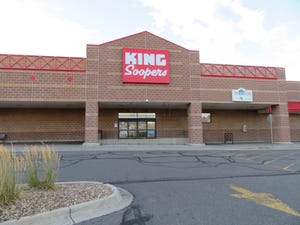STAYING POWERSTAYING POWER
CINCINNATI -- As top management shifts, Kroger Co. executives expressed confidence the chain's ongoing strategic growth plan will help the company maintain its forward momentum through the economic downturn and beyond.David B. Dillon, the chain's newly designated chief executive officer, said he sees an economic recovery ahead, "but I don't know when. The economy is what it is and we won't be able
July 14, 2003
Elliot Zwiebach
CINCINNATI -- As top management shifts, Kroger Co. executives expressed confidence the chain's ongoing strategic growth plan will help the company maintain its forward momentum through the economic downturn and beyond.
David B. Dillon, the chain's newly designated chief executive officer, said he sees an economic recovery ahead, "but I don't know when. The economy is what it is and we won't be able to affect the recovery, so we have to work with the hand we've been dealt," he told SN in an interview.
Kroger's response to the hand it's been dealt is the strategic growth plan it initiated two years ago -- a program that identified ways to utilize economies of scale, eliminate $500 million in costs, and invest the savings in reduced prices to maintain and increase the chain's market share during a period of industry consolidation.
The strategy was developed independently of the state of the economy, Dillon pointed out. "It does not depend on any particular economic environment."
Dillon was part of the Kroger management team that helped formulate the strategic plan, along with Joseph A. Pichler, Don McGeorge and Rodney McMullen.
Pichler stepped down as CEO of Kroger at the company's annual meeting June 28 but said he will retain the title of chairman until he retires sometime before his 65th birthday in October 2004.
Dillon was promoted from president and chief operating officer to CEO and was designated Pichler's successor as chairman; McGeorge moved from executive vice president, corporate merchandising, to president and COO; and McMullen, executive vice president, strategy, planning and finance, was named vice chairman, with additional responsibilities for management information systems and logistics.
Reflecting on the strategic growth plan, Pichler told SN, "We've achieved all the synergies in two-and-a-quarter years that we had planned to achieve in three years, which is a wonderful testament to our team. And on a quarter-to-quarter basis our identical and comparable-store sales have been better than the competition's."
Kroger had hoped to boost gross profit margins this year, but the ongoing economic malaise has prompted the company to anticipate a further lowering of margins by 10 to 25 basis points, Dillon acknowledged.
"We believed gross profits would go up this year, since our costs have fallen in a number of areas. But everyone in the industry is experiencing the same costs, and while we anticipated we would be able to capture more margin, our price structure is based on individual markets, and we won't be able to raise costs as we had hoped, so we changed our plan."
Dillon said the management transition will be smooth and will ensure Kroger's stability. "While a transition in management is important within the life of a company, this one is not a radical shift at all," he explained. "The top management team -- Rodney, Don and I -- have been active with Joe in developing our strategic growth plan and implementing it, and we intend to continue to do the same."
With Dillon's promotion, Pichler said his responsibilities will decrease.
"Dave is taking on the full CEO responsibilities for planning, execution, top-line and bottom-line growth, personnel and succession planning. All I'm here to do is assist Dave in the transition, assist the company on some long-range planning and assist the board in the area of corporate governance," Pichler told SN.
"I'm the luckiest guy in the world," he added. "I was privileged to work with Lyle Everingham [his predecessor as chairman], who remains a dear friend; I've been CEO for 13 years, which is a long time by U.S. standards; I've been able to work with a team I respect and admire; and now I get to see that team carry it forward. It just doesn't get any better than that."
Helping Dillon ease into his new job will be a key to smoothing the transition, Pichler said. "Lyle [Everingham] was of great assistance to me in helping to smooth my transition into the job when he retired in 1990.
"I've been CEO 13 years, and that's a lot of time to experience different aspects of the business that might not be immediately apparent. And I've been at Kroger for 20 years so I know something about the long-ago history of the company."
Pichler's tenure at Kroger has included several significant milestones, he pointed out, including the merger of Kroger and Kansas-based Dillon Cos. that brought him into Kroger management in 1983; the successful avoidance of a hostile takeover in 1988 and the financial restructuring that followed while he was president and chief operating officer; and the merger with Fred Meyer Inc., Portland, Ore., in 1999 -- the largest merger in the history of the industry, he noted.
Industry analysts told SN they expect few changes at Kroger, though they said they anticipate the new executive team may be more apt to flex Kroger's corporate muscles and take a more aggressive position on pricing and promotions. They also said they expect Kroger to continue to outperform its major competitors.
Jason Whitmer, an analyst with Midwest Research, Cleveland, said Kroger's general direction is unlikely to change over the next 12 months, "but we may see some differences in leadership style, with the new management team possibly being a little more aggressive."
"They are the executives who developed the strategic growth plan that recognized the need for Kroger to get down and dirty on pricing," Whitmer said, "and they may attempt to really flex the company's muscles in going after market share and exploiting Kroger's position as the No. 1 conventional chain."
Mark Wiltamuth, an analyst with Morgan Stanley, New York, said any top-level transition provides opportunities for changes in corporate direction, "but in this particular case, Dillon comes in as an insider who's likely to stay the course. However, investors have been asking the company to start paying a dividend and slash capital spending, so there will be opportunities for change in those areas."
Wiltamuth said Kroger is likely to continue to reduce prices in selected markets, "and because it got started [reducing prices] earlier than its competitors and has already adjusted its cost structure, it should perform better than Albertsons or Safeway in the near term. But with Albertsons announcing it will get more aggressive in pricing, a lot depends on the market's response to those actions."
According to Jonathan Ziegler, principal in PUPS Investment Management, Santa Barbara, Calif., since the newly promoted executives have all worked together for years, few changes are likely. "This is the management team that brought Kroger to where it is, and there's not a lot of reason to change," he said.
In terms of opportunities for change, Ziegler said Kroger management has a chance to alter its relationship with the labor unions in the area of work rules. "Kroger has had a good relationship with the unions because it pays, but some of that may have to be modified as long as Kroger has to compete with non-union operators like Wal-Mart."
John Heinbockel, an analyst with Goldman Sachs, New York, said Kroger is outperforming its major competitors in terms of real growth (sales excluding fuel and the drug stores Albertsons operates, plus deflation and inflation). "On a quarter-to-quarter basis, Kroger's real growth improved 70 basis points, vs. zero improvement for Safeway and 110 basis points of erosion at Albertsons," he pointed out.
Kroger is also experiencing the least amount of gross margin pressure among the three major chains, Heinbockel added, "[because] Kroger already possesses generally superior pricing positions, thereby limiting its need or desire to make further investments, and it is not enduring some of the transitional procurement function problems, primarily tied to centralization, that [its] peers are."
Kroger has enjoyed considerable unit growth since it acquired Fred Meyer Inc. in 1999, adding 200 stores on an individual and group basis during that time, Dillon said -- the equivalent of a full Kroger division, Pichler pointed out.
Regarding future acquisitions, Dillon said, "It all depends on circumstances. We will be very selective and opportunistic in the sense that we won't spend money without getting a return. At this point we're interested only in in-market growth through acquisition."
Kroger is about to open its two largest stores under the Kroger banner in the Cincinnati area -- an expanded store in Hyde Park encompassing 101,000 square feet, which is scheduled to open around Labor Day, and a new store in Anderson Towne Center covering 104,000 square feet, which is scheduled to open sometime in 2004.
Whitmer told SN he expects the two stores to reflect elements of the Marketplace stores Kroger developed in the Arizona market, which are smaller versions of Fred Meyer supercenters. "Kroger is very tightly focused on one-stop shopping, whether it's utilizing elements of the Fred Meyer stores or some of the best practices from its Arizona operations.
"The company is doing some good things with format extensions, and having that balance of formats will help it continue to do well," Whitmer said.
Asked why the company is opening two oversized stores, Dillon replied, "We think we have opportunities at those locations to make those assets work even better."
However, he indicated that such oversized stores are not likely to begin popping up across Kroger's distribution area. "The sales potential and demographics [at those two stores] are location-specific," Dillon explained.
He declined to pinpoint how Kroger would fill the 30,000 square feet of extra space. "Come see us when we open," he said.
Cheering the Team Spirit
SN asked Kroger's Joe Pichler what his most significant accomplishment was at Kroger. He acknowledged his team and said, "As a team, our most significant accomplishment has been the ability to maintain Kroger's integrity and its commitment to customer service during some very challenging times.
"I'm also proud of the company's solid financial performance, which is a wonderful tribute to the team. And our stock price has outpaced our peer group in each of the last 11 years, and we've outpaced the Standard & Poor's 500 in nine of those 11 years, which is wonderful testament to the team.
"Kroger is the 18th largest company in sales in the U.S., with over 300,000 employees, so no one person can take responsibility for what we've accomplished."
You May Also Like




